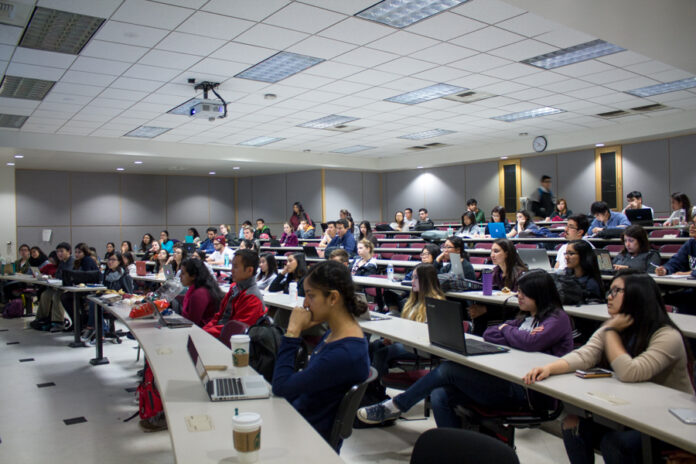Program offers professors, students the chance to delve into topics that spark passion
Stand-up comedy. Figs. Honeybees. Zombies. All of these are at the top of syllabi for many first-year students thanks to a unique seminar program.
Incoming college students often find it difficult transitioning from traditional high school classroom sizes of 30 students to college lecture halls of hundreds of students. For this reason, UC Davis implemented the First-Year Seminar Program designed specifically for first-year students.
“It’s been around for about 30-plus years,” said Eddy Ruiz, the associate director for the first-year seminars and the University Honors Program. “We’re a big research university, a lot of classes are large and so their focus is for first years, and they’re small, limited to 19 students, so what that does is it creates a space for students to feel some connection to students with their faculty and engage in low-risk activity that has academic rigor attached to it because it’s only one to two units.”
Each seminar is focused on a different topic, anything ranging from stem cell and genetic engineering to the philosophy of tai chi chuan. These courses are proposed by professors and must meet the criteria and core values that first-year seminars are based upon.
“We want to have interdisciplinary thought, communications, ethics, people that are going to think about change, inclusivity […] those are all core values that we hold in our evaluation of the program and the courses taught within it,” Ruiz said.
Ruiz also noted the popularity of first-year seminars over the program’s duration among faculty and students.
“I take them because they are about interests that I have and they’re also low-stress, so I can explore interests in a low-stress environment,” said Chris Pettit, a first-year political science major. “They’re the smallest classes I have, so I get to spend a lot of time with the professor, who’s an expert in that interest.”
There are many reasons why students take courses within the program. A number of classes in the program are supplemental to academic courses while others, being more silly, just offer students a new hobby or niche interest. The unique topics of each class attract other students to experiment with different breadths of study while they explore their interests.
“I’ve taken two first-year seminars, one in the fall and one in the winter,” Pettit said. “I also plan on taking another one in the spring. The one in the fall was about the first amendment and freedom of speech. The one in the winter was about Mad Men.”
The professors teaching these classes also understand the amount of stress students experience, especially during their first year in college as they are still transitioning into a system that is unfamiliar to them. These classes, however, don’t just benefit the students, but allow professors a unique opportunity.
Professors come to propose and lead these classes out of their own interests as well. They may choose to escape teaching large lecture hall sized classes to teach a smaller group of students and drive the students’ interests in a certain field of knowledge while feeding their own interests in that topic.
“It is important for me to share my knowledge and motivate people and excite them about [a field], and also, I get great inspiration from people like the students in my class because everyone is so bright, so motivated and it inspires me,” said Robert Hackman, a professor in the department of nutrition who is currently teaching a first-year seminar called ‘Applied Nutrition for College Students.’
Hackman responded to a question on how he develops topics for the seminars he teaches. “I want to blend the information with the excitement I feel about nutrition and make it applicable to people’s daily lives so that instead of talking about theory, we can talk about practical, real impacts,” Hackman said.
Hackman’s teachings are reflected in his student’s experiences outside of the classroom. Tonie Leech, a first-year pharmaceutical chemistry major, and Chiso Akams, a first-year biochemistry and molecular biology major, expressed that what they learn in the class is applicable to their lives out of class.
“I’ve been a faculty member for 38 years and I think this is one of the most valuable educational experiences here,” Hackman said. “To have small class sizes in your first year where the professor knows everybody’s name and knows what everyone’s doing every week by the homework assignments and discussions is the best way to promote behavior change and promote critical thinking skills.”
Written By: LINH NGUYEN — features@theaggie.org




